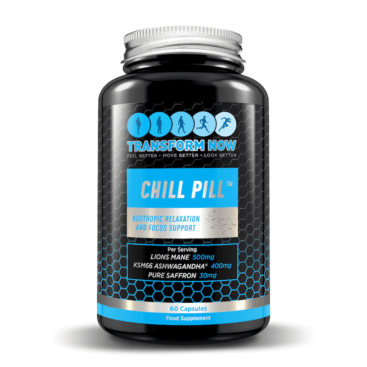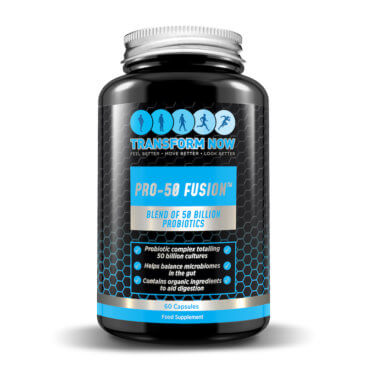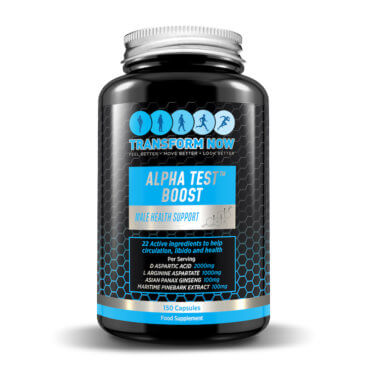Testosterone plays a huge role in building muscle, sex drive, energy, bone density, cardiovascular health and numerous other bodily functions for men. Declining levels of testosterone levels, regardless of age, can increase the risk of prostate cancer, heart disease [1], depression [2] and even death [3]. Before we examine testosterone replacement therapy, it’s very important to examine lifestyle, nutrition and other ways to boost testosterone.
Lifestyle changes that can increase testosterone naturally.
Switch off your phone and get more sleep.

Since childhood, we’re all told about the importance of sleep and building good sleeping habits. Stress, workload, partying, and general lifestyle patterns play havoc with sleep but so does your mobile phone. Switch it off and try to get a good eight hours in.
Numerous studies show that a lack of sleep can reduce testosterone levels by 10-15% and even higher in some cases. As you get older, your testosterone levels start to decrease by an average of 1-2% so, with lack of sleep, the loss in testosterone can be significant [4]. Even a week’s reduction in sleep can reduce morning testosterone levels significantly [5].
It may seem macho to sleep less but not if it contributes to lower testosterone levels.
Exercise more.
Being fit and exercising is common sense for good health, quality of life and longevity. It’s also crucial for optimal testosterone levels as a lack of exercise, and poor nutrition can lead to obesity which will also lower your testosterone levels [6].
Increased BMI may not be the most accurate measure for obesity [7]. In fact, waist circumference is a more important factor for overall health. Studies have shown that the larger the waist, the lower the levels of the testosterone. Men who had a waist of more than 102cm had lower levels of serum testosterone [8] in comparison to men with a waist less than 94 cm.
Other studies have shown that if men lose weight and reduce their waist size serum levels of testosterone rise. Increased levels of fat and obesity also reduce your testosterone levels [9]. They also increase your risk of heart disease, diabetes, hypertension, back pain, and countless other medical conditions.
It’s been shown that resistance exercise is more likely to result in increased testosterone as well as increasing levels of growth hormone (GH) [10] than, for example, walking or swimming. The best approach would be to include cardiovascular training into your exercise or training plan.
Don’t worry, be happy.

Stress has always been known to be harmful to health and is often referred to as a silent killer. As well as increasing cardiovascular risk and hypertension, high levels of stress will drastically reduce your levels of testosterone [11]. Reduce levels of stress by exercising, starting a hobby, or taking up Tai Chi or yoga. Try focusing on breathing techniques, working less, listening to music, etc.
Cut down on alcohol.
Drinking or excessive drinking has a significant effect on lowering levels of testosterone [12] as well as, of course, having many other harmful effects. Alcohol was also shown to reduce fertility in both men and women[13].
Testosterone boosting foods and nutrients.
Eat good fats.
It may seem like bad advice when everyone is telling you to cut down on fats but eating good fats increases your levels of testosterone. Saturated fats from meat, egg yolks, butter, nuts, olives, etc. [14], are recommended, but this must be part of a calorie-controlled and balanced diet. The study recommending fats also advocated including resistance exercise program into your routine.
Cholesterol contributes to more effective testosterone synthesis[15], and steroid hormones regulate functions such as reproduction, blood salt balance, and maintenance of secondary sexual characteristics amongst other things. They are manufactured from cholesterol, mainly in the adrenal gland and gonads in response to tissue-specific tropic hormones[16]. To balance any adverse effects, you should also include omega oils from fish, nuts, and seeds in your diet.
Top up on your Zinc.
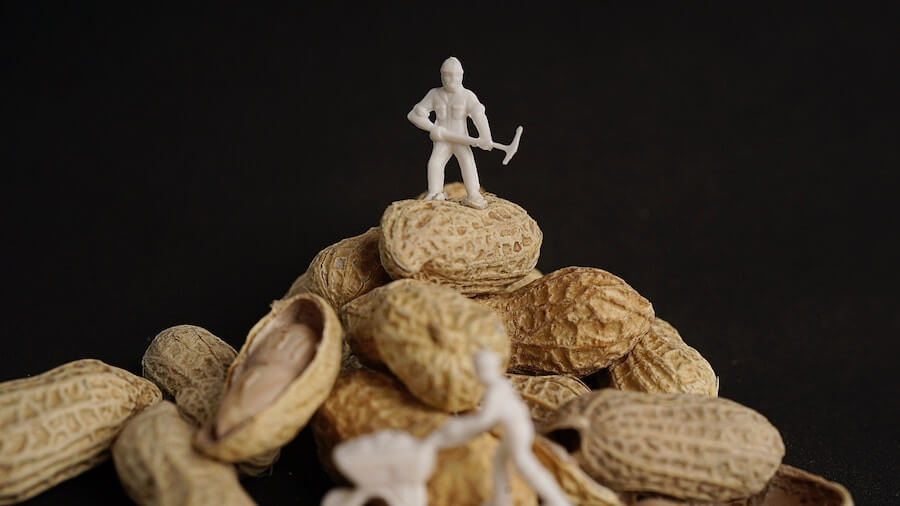
Zinc is a key mineral that cells use to metabolize nutrients. Your immune function, DNA and protein production, and cell division are all related to zinc levels in the body. zinc also enables men to produce testosterone.[17]. Studies have shown that zinc can boost levels of a hormone that allows your testes to circulate testosterone into your bloodstream. Research also indicates that low levels of zinc can also lower levels of testosterone [18].
Supplementing your diet with zinc has been shown to increase testosterone levels and also decrease aromatization (the process by which testosterone rapidly converts to the female hormone oestrogen).[19]. Foods rich in zinc include oysters, nuts, meats, whole grains, and dairy.
Take vitamin B9 and other B vitamins.
Folic acid or folate, also known as vitamin B9, is an extremely important B Vitamin. Like many of the others, it needs to taken via food or as a supplement. Folic acid is important for men and women for good sexual health. It is particularly important in men for fertility, levels of testosterone and the prevention of erectile dysfunction[20].
Foods rich in B9 include beetroot, citrus fruits, whole grains, beans, and green leafy vegetables.
Vitamin B3 (Niacin) has been known to reduce fatigue and tiredness, increase energy and help with libido. It’s one of the eight essential B vitamins which your body needs. It has some very useful benefits ranging from improving cholesterol levels, cognitive process, reducing headaches, as well as improving circulation [21]. Vitamin B3 also can help with vasodilatation, which can not only lower blood pressure but help with erectile dysfunction [22].
Ensure you’re getting enough vitamin D3.
Vitamin D3 is a fat-soluble secosteroid, essentially considered a sub steroid, responsible for increased absorption in the intestine of magnesium, calcium, and phosphates. It has numerous health benefits, one of which is to increase testosterone production [23] [24] [25].
Foods rich in D3 are salmon, egg yolks, mackerel, milk, and mushrooms.
Add Fenugreek to your diet.
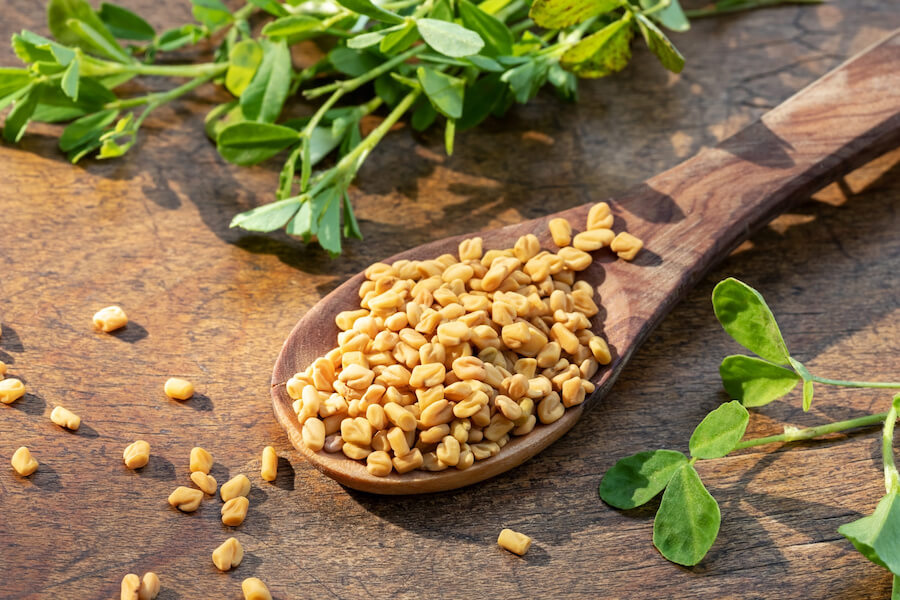
Fenugreek is an ancient herb and has a very distinct aroma and taste. It has a very high ratio of zinc, magnesium and selenium and the ability to increase levels of sex hormone-binding globulin (SHBG). This protein is responsible for causing a reduction in testosterone in your bloodstream, so if it is inhibited your ‘free’ testosterone is not able to work effectively [26] [27] [28].
Supplement with L-Arginine aspartate.
L- Arginine aspartate is an important amino acid that converts into nitric oxide in the body, which increases vasodilatation and circulation. This is good for athletes but also helps with testosterone levels and erectile dysfunction [29].
Another interesting Amino Acid is D-Aspartic acid which can boost testosterone levels [31]. The main function of D-AA is to act as a type of neurotransmitter and is found in the pituitary and pineal glands.
Further, D-AA is in Leydig cells found in the male testicles. D-AA works in the brain to cause a release of hormones, such as luteinizing hormone, follicle-stimulating hormone, and growth hormone. Some studies have shown that it may also improve sperm quality [32].
If you find after increasing exercise, improving diet and taking supplements, you still feel the symptoms of low testosterone, then you should have a blood test and seek medical advice.
References.
- https://www.ncbi.nlm.nih.gov/pmc/articles/PMC5512682/
- https://www.ncbi.nlm.nih.gov/pubmed/15669883
- https://www.ncbi.nlm.nih.gov/pubmed/15669883
- https://www.sciencedaily.com/releases/2011/05/110531162142.htm
- https://www.ncbi.nlm.nih.gov/pmc/articles/PMC4445839/
- https://www.ncbi.nlm.nih.gov/pmc/articles/PMC3040039/
- https://www.medicalnewstoday.com/articles/265215.php#1
- https://www.ncbi.nlm.nih.gov/pubmed/15461197
- https://www.ncbi.nlm.nih.gov/pubmed/25982085
- https://www.ncbi.nlm.nih.gov/pubmed/2796409
- https://www.ncbi.nlm.nih.gov/pubmed/15618989
- https://www.ncbi.nlm.nih.gov/pubmed/12711931
- https://www.ncbi.nlm.nih.gov/pmc/articles/PMC5894513/
- https://www.physiology.org/doi/full/10.1152/jappl.1997.82.1.49
- https://www.ncbi.nlm.nih.gov/pmc/articles/PMC2262169/
- https://www.ncbi.nlm.nih.gov/pmc/articles/PMC2890697/
- https://www.nap.edu/read/10026/chapter/15
- https://www.ncbi.nlm.nih.gov/pubmed/8875519/
- https://www.ncbi.nlm.nih.gov/pubmed/8875519
- https://www.ncbi.nlm.nih.gov/pubmed/26302884
- https://www.ncbi.nlm.nih.gov/pmc/articles/PMC2705821/
- https://efsa.onlinelibrary.wiley.com/doi/abs/10.2903/j.efsa.2010.1757
- https://www.ncbi.nlm.nih.gov/pubmed/21154195/
- https://www.ncbi.nlm.nih.gov/pmc/articles/PMC5503426/
- https://www.catie.ca/en/treatmentupdate/treatmentupdate-185/nutrition/can-vitamin-increase-testosterone-concentrations-men
- https://www.ncbi.nlm.nih.gov/pmc/articles/PMC6191980/
- https://www.ncbi.nlm.nih.gov/pubmed/2194788
- https://www.ncbi.nlm.nih.gov/pubmed/21116018
- https://www.ncbi.nlm.nih.gov/pubmed/20300016
- https://www.scirp.org/pdf/ASM20120400001_62630923.pdf
- https://www.ncbi.nlm.nih.gov/pmc/articles/PMC2774316/
- https://www.researchgate.net/publication/276491066_D-Aspartate_a_Key_Element_for_the_Improvement_of_Sperm_Quality


